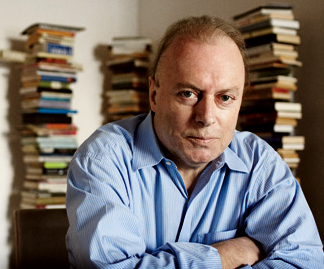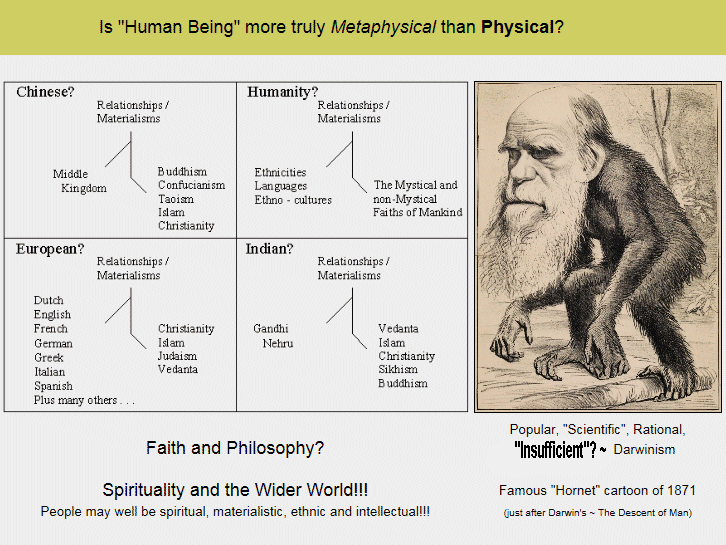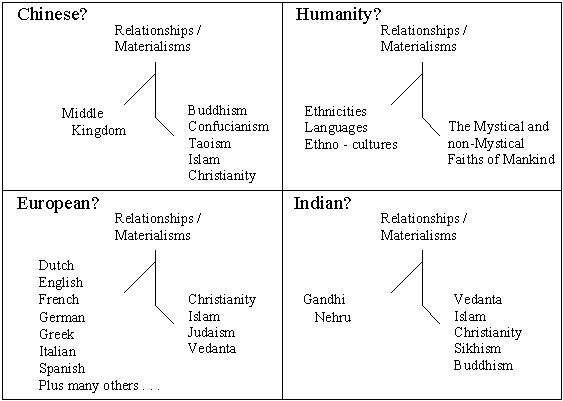Christopher Hitchens
quotations and quotes
on Gods and Religions

Christopher Hitchens 1949-2011
On this page visitors can find many variously interesting, amusing and provocative quotations and quotes from
Christopher Hitchens about Gods, Religions, Faith and Religious Beliefs.
After a few of these quotations and quotes have been presented mention is made of a "Metaphysical-Philosophical" approach which could have potential to better
promote acceptance of Co-existence between Science and Religion.
Following on from this mention of things "Metaphysical-Philosophical" yet more quotations and quotes - about Gods, Religions, Faith and Religious Beliefs attributed to Christopher Hitchens are presented.

"What can be asserted without proof can be dismissed without proof."
"Less than Miraculous," Free Inquiry magazine (February/March 2004), Volume 24

"Human decency is not derived from religion. It precedes it."
Christopher Hitchens (God Is Not Great: How Religion Poisons Everything)

"Thus, though I dislike to differ with such a great man, Voltaire was simply ludicrous when he said that if god did not exist it would be
necessary to invent him. The human invention of god is the problem to begin with."
Christopher Hitchens (God Is Not Great: How Religion Poisons Everything)

"I try to deny myself any illusions or delusions, and I think that this perhaps entitles me to try and deny the same to others, at least as
long as they refuse to keep their fantasies to themselves."
Christopher Hitchens (Hitch-22: A Memoir)

"And here is the point, about myself and my co-thinkers. Our belief is not a belief. Our principles are not a faith. We do not rely solely upon
science and reason, because these are necessary rather than sufficient factors, but we distrust anything that contradicts science or outrages
reason. We may differ on many things, but what we respect is free inquiry, openmindedness, and the pursuit of ideas for their own sake."
Christopher Hitchens (God Is Not Great: How Religion Poisons Everything)
And now ~ some Metaphysics!
and Philosophy?
"There's neither honesty, manhood, nor good fellowship in thee."
William Shakespeare
"…can we possibly refuse to admit that there exist in each
of us the same generic parts and characteristics as are found in
the state? For I presume the state has not received them from any
other source. It would be ridiculous to imagine that the presence
of the spirited element in cities is not to be traced to
individuals, wherever this character is imputed to the people, as
it is to the natives of Thrace, and Scythia, and generally
speaking, of the northern countries; or the love of knowledge,
which would be chiefly attributed to our own country; or the love
of riches, which people would especially connect with the
Phoenicians and the Egyptians."
Socrates / Plato ~ Famous Philosophers who lived in Ancient Greece

"The greatest obstacle to discovery is not ignorance - it is the illusion of knowledge."
Daniel J. Boorstin
"You will hear things like, "Science doesn't know everything." Well, of course science doesn't know everything. But,
because science doesn't know everything, it doesn't mean that science knows nothing. Science knows enough for us to
be watched by a few million people now on television, for these lights to be working, for quite extraordinary
miracles to have taken place in terms of the harnessing of the physical world and our dim approaches towards
understanding it. And as Wittgenstein quite rightly said, "When we understand every single secret of the universe,
there will still be left the eternal mystery of the human heart."
Stephen Fry quoting Wittgenstein during a Room 101 TV program
Vivekananda was an Indian Holy Man who made a much-appreciated appearance at the Parliament of World Religions which convened in Chicago in 1893.
In his work Religion and Science Vivekananda tells us that:-
Religion deals with the truths of the metaphysical world just as chemistry and the other natural sciences deal with the truths of the physical world. The book one
must read to learn chemistry is the book of nature. The book from which to learn religion is your own mind and heart. The sage is often ignorant of physical science,
because he reads the wrong book - the book within; and the scientist is too often ignorant of religion, because he too reads the wrong book - the book without.

The presentation of "Tripartite" Human Nature posited above could prove to be rather controversial.
Given this possibility a full consideration of all
of this is given on ~ Our Human Nature - Tripartite Soul page ~
for the benefit of interested readers, but also to provide defensive argument against challenge from
potential detractors!
Such defence would, undoubtedly, arise from the evidence on that page that not only, (very significantly), Jesus' central teachings and (significantly),
Emerson, Pythagoras and Plato / Socrates but also, (very significantly), Islam, Hinduism-Vedanta, Buddhism and Sikhism, and (significantly), Shakespeare offer substantial
implicit support to the presence of an already established,
if largely unappreciated, universal recognition that an "Existential Tripartism" is present in all Human Beings.
Where this could, possibly, lead ...

N. B. The page mentioned in the graphic ~ roots.asp ~ has been replaced by this page
This 'knot of roots' insight features in ~ Emerson's key essay 'History'
Advaita Vedanta proposes a non-dualism wherein the individual spirit (Atman) is seen as being identical with
ultimate reality (Brahman).
That which is nearest is least observed. The Atman is the nearest
of the near, therefore a careless and unsteady mind gets no clue
to the Atman. But one who is alert, calm, self-restrained, and
discriminating, ignores the external world and, diving more and
more into the inner world, realizes the glory of the Atman and becomes great.
Vivekananda
Stand upon the Atman, then only can we truly
love the world. Take a very, very high stand;
knowing our universal nature, we must look
with perfect calmness upon all the panorama of the world.
Vivekananda
This is the secret of spiritual life: to think that I am the Atman and not the body, and that the whole of
this universe with all its relations, with all its good and all its evil, is but as a series of
paintings - scenes on a canvas - of which I am the witness.
Vivekananda ~ 'Vivekananada' is a 'Name-in-Religion' which translates as 'The Bliss of Discerning Wisdom'

"Many religions now come before us with ingratiating smirks and outspread hands, like an unctuous merchant in a bazaar. They offer consolation
and solidarity and uplift, competing as they do in a marketplace. But we have a right to remember how barbarically they behaved when
they were strong and were making an offer that people could not refuse."
Christopher Hitchens

"Thus the mildest criticism of religion is also the most radical and the most devastating one. Religion is man-made. Even the men who made it cannot
agree on what their prophets or redeemers or gurus actually said or did. Still less can they hope to tell us the "meaning" of later discoveries
and developments which were, when they began, either obstructed by their religion or denounced by them. And yet - the believers still claim to
know! Not just to know, but to know everything. Not just to know that god exists, and that he created and supervised the whole enterprise, but
also to know what "he" demands of us - from our diet to our observances to our sexual morality. In other words, in a vast and complicated
discussion where we know more and more about less and less, yet can still hope for some enlightenment as we proceed, one faction - itself
composed of warring factions - has the sheer arrogance to tell us that we already have all the essential information we need. Such stupidity,
combined with such pride, should be enough on its own to exclude "belief" from the debate. The person who is certain, and who claims divine
warrant for his certainty, belongs now to the infancy of our species. It may be a long farewell, but it has begun and, like all farewells,
should not be protracted."
Christopher Hitchens (God Is Not Great: How Religion Poisons Everything) p. 4

"One must state it plainly. Religion comes from the period of human prehistory where nobody-not even the mighty Democritus who concluded that
all matter was made from atoms-had the smallest idea what was going on. It comes from the bawling and fearful infancy of our species, and is a
babyish attempt to meet our inescapable demand for knowledge (as well as for comfort, reassurance and other infantile needs). Today the least
educated of my children knows much more about the natural order than any of the founders of religion, and one would like to think - though the
connection is not a fully demonstrable one - that this is why they seem so uninterested in sending fellow humans to hell."
Christopher Hitchens (God Is Not Great: How Religion Poisons Everything)

"We are the offspring of history, and must establish our own paths in this most diverse and interesting of conceivable universes - one indifferent
to our suffering, and therefore offering us maximum freedom to thrive, or to fail, in our own chosen way."
Christopher Hitchens

"Religion ends and philosophy begins, just as alchemy ends and chemistry begins and astrology ends, and astronomy begins."
From an nterview with Lou Dobbs

"How do I know that I know this, except that I've always been taught this and never heard anything else? How sure am I of my own views? Don't take refuge in the false security of consensus, and the feeling that whatever you think you're bound to be OK, because you're in the safely moral majority."
Christopher Hitchens
Some Human Mysteries?
"You will hear things like, "Science doesn't know everything." Well, of course science doesn't know everything. But,
because science doesn't know everything, it doesn't mean that science knows nothing. Science knows enough for us to
be watched by a few million people now on television, for these lights to be working, for quite extraordinary
miracles to have taken place in terms of the harnessing of the physical world and our dim approaches towards
understanding it. And as Wittgenstein quite rightly said, 'When we understand every single secret of the universe,
there will still be left the eternal mystery of the human heart.'"
Stephen Fry quoting Wittgenstein during a Room 101 TV program
|
|



![]()
![]()